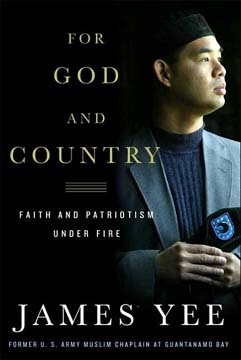 |
James Yee, a West Point graduate and Muslim Army chaplain, was arrested in September 2003 for spying and aiding the enemy while ministering to detainees at Guantánamo Bay, Cuba. His record was eventually cleared. Yee has since written a book about his experience, For God and Country: Faith and Patriotism Under Fire.
For me, the Oh, no moment came even before 9/11. It happened after the federal building in Oklahoma was bombed. I thought that Muslims would definitely be blamed; regardless of who conducted the attack, I knew there would be backlash, and there was. So when the planes hit, I thought, This is going to happen again.
I don't buy into this idea that we are engaged in a clash of civilizations. I just don't buy it. I'm an American and I'm a Muslim. There is no conflict between the two. They actually complement each other. Even more than that: They are parallel.
Diversity is both an American and an Islamic value. Religious freedom is both an American value and an Islamic value. Tolerance is both an American and Islamic value—although Islam is portrayed in America as very intolerant. But those who study Islam know that's a bunch of baloney. Islam accepts all people, regardless of what nationality or ethnicity you are. As a student, I read that, and I thought I understood. But it wasn't until I actually went to Mecca for the first time that I really understood. I thought I would be the only Chinese Muslim there. That couldn't have been further from the truth. There were Muslims of every color and ethnicity, from every country in the world.
When I saw this overwhelming diversity of humanity, the first thing I thought about was my upbringing in the American school system. In school, they always taught that America is the land of the free, the home of the brave—a big melting pot of all ethnicities who came in through Ellis Island. And that's the same attitude promoted by Islam; that's what I felt so profoundly in Mecca. In that way, converting to Islam reemphasized my American values. Another value traditionally held by both America and Islam is the humane treatment of prisoners.
This was something that was valued highly by the prophet Muhammad. For example, when he retook Mecca, he granted amnesty to all of the Arab pagans he defeated. This is why we're still in this quagmire in Iraq. Instead of winning hearts and minds, we insult and offend. The desecration of the Koran, the burning of Muslim dead bodies in Afghanistan, the abuses at Abu Ghraib, the abuses at Guantánamo—what's going on there perverts our entire system of values. I don't think the public realizes the enormous negative impact that it will have on our nation's history.
People ask me: How do you feel about the military today? How do you feel about your country? Your government? I don't allow myself to look at what happened to me in a negative way. I don't look at it as my country versus me. Believe it or not, I still have faith in the workings of the government. Even after being placed in solitary confinement for seventy-six days, even after being called a spy and a traitor to the United States, even after being threatened with the death penalty, I believe in the system. In the end, an innocent man went free. In the end, my record was wiped clean. I got restored back to duty at full status.
When I was in solitary confinement, it was not only my religious faith that got me through everything, it was also the idea of emotional intelligence—being able to control your emotions, whether it's bitterness or anger, nervousness or uncertainty or intimidation. It's okay to be bitter. It's okay to be angry. We all know the expression "forgive but don't forget." You can forgive, but you can't forget, because that allows the potential for something to happen again. But you have to forgive to be able to learn from an experience. You have to be able to turn that experience, no matter how negative it was, into something positive.
When I was in the military, I had a tremendous impact and made enormous contributions by educating people about Islam and Islamic culture and by promoting the values that are both Islamic and American—diversity, tolerance, religious freedom. Today, I continue to do the same, though perhaps on a much greater level. If not for the suffering I endured, I would never have had the influence I have today. Having my book published, being on the lecture circuit, engaging the media—I am continuing to contribute to the building of our great nation. As the Koran says: "Perhaps you dislike something, but in it there is much good." That is the lesson I take from all of this. That no matter how negative a situation is, you can find the good in it. That is how I focus my life, now more than ever.
Page created on 4/7/2007 11:48:09 AM
Last edited 1/9/2017 4:33:39 PM
